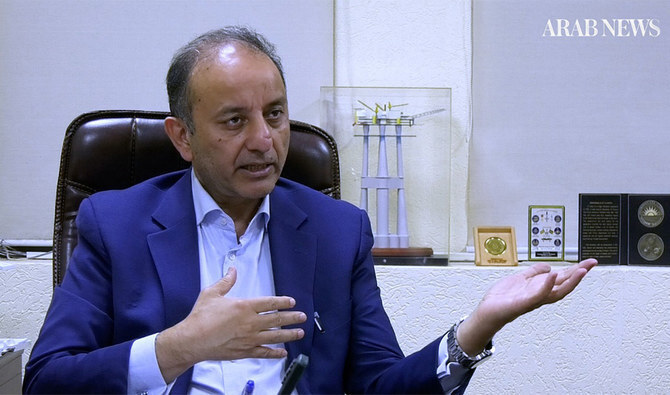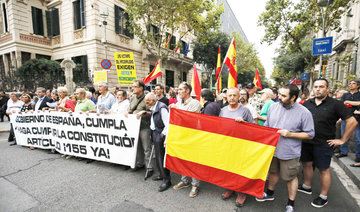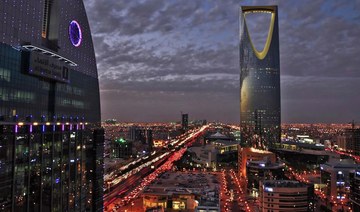BARCELONA: The president of Spain’s Catalonia region arranged and then hastily canceled an official address Thursday amid speculation that he might back off a full independence bid by calling a snap election.
Later Thursday, Catalonia’s Parliament is expected to debate how to respond to plans by Spanish authorities to take direct control of the prosperous northeastern region, home to 7.5 million people.
The Catalan issue has led to Spain’s deepest political crisis in the four decades since the country restored democratic rule after Gen. Francisco Franco’s dictatorship.
Catalonia has been in a standoff with Spain since a disputed Oct. 1 referendum on independence. Those who voted were overwhelmingly in favor, but less than half of eligible voters went to the polls.
Still, Catalan President Carles Puigdemont has said the referendum, which was outlawed by Spain’s constitutional court, gave him the mandate to declare independence.
But so far he has stopped short of proclaiming a new republic, saying he wants to give the Spanish government a chance to negotiate.
Madrid, for its part, insists it cannot negotiate secession, and Prime Minister Mariano Rajoy is seeking to activate constitutional powers that will allow the government to take over control of much of the autonomous region’s affairs. The Spanish Senate is scheduled to approve the plan to trigger Article 155 of the Constitution on Friday.
Two parliamentary officials told The Associated Press that Puigdemont had offered through mediators to call the snap election if the central government dropped the takeover bid, but Rajoy’s ruling Popular Party refused.
The officials spoke on condition of anonymity as the discussions were not being made public.
Popular Party Sen. Javier Arenas said a call for new regional elections would not be enough to stop the Senate. The Spanish government said it would not comment until after Puigdemont makes his stance clear.
The leading opposition Socialist party, meanwhile, says the government must stop the intervention process if Catalonia calls elections within a constitutional framework.
Puigdemont risks being charged with rebellion, something that could land him in jail.
A sudden announcement Thursday morning by Puigdemont’s office that the president would address the media fueled speculation he might be about to back off an expected full declaration of independence.
Quoting unnamed government sources, Catalonia’s main newspaper La Vanguardia reported he was planning to dissolve the regional Parliament and call a fresh election for Dec. 20.
It is not clear, however, that an election would solve any of Spain’s problems with Catalonia as polls consistently show pro-independence parties would likely again win most seats.
Regional vice president Oriol Junqueras, who represents a harder pro-independence line in the ruling coalition, told The Associated Press on Wednesday that the Spanish government had left Catalonia “no other option” but to push ahead with the secession bid.
Puigdemont’s Cabinet, including Junqueras, held frantic meetings overnight and on Thursday morning. They were joined by the regional Parliament’s speaker and representatives of Assemblea Nacional Catalana and Omnium Cultural, the grassroots organizations that have been key in the independence push.
The political confusion came as thousands of university and high school students took to the streets to protest Madrid’s takeover plans.
The protesters, many draped in the red and yellow Catalan flag and holding banners calling for independence, marched through central Barcelona, blocking several nearby streets as they headed to the government palace where Puigdemont was expected to speak.
The atmosphere was festive as they marched past the Barcelona headquarters of Spain’s national police shouting “out with the occupation forces,” a slogan that has become ubiquitous in protests since police trying to halt the independence referendum clashed violently with voters.
Some protesters sang “Els Segadors,” the Catalan official anthem. One student leader shouted into a microphone: “Carles, don’t take a step backwards ... don’t be a coward!“
Another protester, 17-year-old high-school student Albert Salgueda, said he would be disappointed if Puigdemont called elections.
“We think the only solution is a declaration of independence. We have come too far to go back now,” he said. If elections were called, “we will go on strike and stop the country. This is the point of no return.”
But not all the demonstrators were in favor of independence.
Seventeen-year-old Martina Gallego said that while she didn’t want Catalonia to secede from Spain, she objected strongly to how the Spanish government is treating the region.
“They are taking all our rights of autonomy away,” she said. “I’m not in favor of independence, but I don’t think this is right.”
Confusion as Catalan president cancels address
Confusion as Catalan president cancels address

Pakistan ends lockdown of its capital after Imran Khan supporters are dispersed by police

“All roads are being reopened, and the demonstrators have been dispersed,” Interior Minister Mohsin Naqvi said.
Khan’s wife, Bushra Bibi, who was leading the protest, and other demonstrators fled in vehicles when police pushed back against the rallygoers following clashes in which at least seven people were killed.
The police operation came hours after thousands of Khan supporters, defying government warnings, broke through a barrier of shipping containers blocking off Islamabad and entered a high-security zone, where they clashed with security forces.
Tension has been high in Islamabad since Sunday when supporters of the former prime minister began a “long march” from the restive northwest to demand his release. Khan has been in a prison for over a year and faces more than 150 criminal cases that his party says are politically motivated.
Hundreds of demonstrators have been arrested since Sunday.
Bibi and leaders of her husband’s Pakistan Tehreek-e-Insaf party fled to Mansehra in Khyber Pakhtunkhwa province, where the party still rules.
Khan, who remains a popular opposition figure, was ousted in 2022 through a no-confidence vote in Parliament.
Saudi Arabia, Pakistan in talks on refinery upgrades, greenfield project: official says

RIYADH: Saudi Arabia is set to deepen its strategic partnership with Pakistan through talks on refinery upgrades and a greenfield project for petroleum products, according to an official.
Speaking to Arab News on the sidelines of the World Investment Conference held in Riyadh, Musadik Malik, senator and minister of state for petroleum of Pakistan, noted that the collaboration extends beyond energy projects and includes an agreement to connect power grids between the two nations.
“We are working very closely with the Kingdom to figure out how, what are the future energy needs, particularly in the area of renewables, and jointly, we’re going to identify and scope the opportunity, and jointly we’re going to build a program to fulfill those needs,” Malik said.
He continued: “We have two different projects which are right now under, to say, research.
One is the upgradation of quantifier refineries, and the other is a large greenfield refinery which would not only produce petroleum products but also hydrocarbons. These are under research and negotiation, so these are not finalized.”
Malik highlighted that the partnership goes beyond just securing investments or transferring advanced technology. Instead, it involves a joint effort to carefully analyze Pakistan’s future energy needs and map out potential scenarios for how these demands might evolve over time.
This forward-looking approach ensures that both nations are not just reacting to immediate energy challenges but are proactively planning for the long term.
By working together to address these evolving requirements, Saudi Arabia and Pakistan aim to guarantee Pakistan’s energy security, creating a sustainable and reliable framework that supports the country’s growth and development.
Saudi Arabia and Pakistan are making significant strides in strengthening private-sector collaborations, with multiple agreements already yielding tangible results.
Malik highlighted the proactive approach both nations are taking to foster business-to-business partnerships.
“Our prime minister believes that the government should not be in the business of doing business but should facilitate it,” he said, emphasizing the central theme of the collaboration.
“A very large part of the concept we are jointly building on is the private sector of the Kingdom working with the private sector of Pakistan.”
The minister added that around $2.8 billion worth of memorandums of understanding have been signed between the two countries in October.
“Out of these 28 to 30 MOUs, seven or eight have already been converted into contracts and executed within just three to four months,” Malik said.
He continued, explaining the momentum of the partnership: “We have transacted significant deals, and contracts are in motion. Yesterday (Nov. 25), during a roadshow with the Kingdom’s private sector, we secured a non-disclosure agreement that could pave the way for a $1.8 billion investment.”
Malik emphasized the multifaceted nature of Saudi Arabia’s involvement in Pakistan, describing it as a “360-degree view” encompassing both public and private sectors.
“We are not only receiving investments and technology but also collaborating on long-term strategies to meet Pakistan’s growing energy demands,” he said. “The Kingdom’s Public Investment Fund and subsidiaries are actively identifying opportunities for mutual growth.”
Pakistan is tackling the challenge of energy demand fluctuations, a longstanding issue where consumption peaks in summer and drops to a third during winter.
This cyclicality forces the country to make capacity payments to investors, covering equity returns and debt servicing even when energy is underutilized, Malik explained.
To address this inefficiency, Pakistan signed an MoU with Saudi Arabia to connect their power grids.
“This grid connection will allow energy produced in the Kingdom and Pakistan to be transacted seamlessly,” Malik said. “When we connect with Saudi Arabia, it effectively means connecting with the GCC as well.”
The initiative also aligns with regional energy strategies, as Pakistan seeks similar arrangements with Central Asian states.
“In Central Asia, energy demand is high in winter and negligible in summer. With this connectivity, deficits will no longer remain deficits, and surpluses will clear in real-time,” he added, highlighting plans for a unified energy market facilitated by a shared grid.
Malik concluded the interview by praising Saudi Arabia’s unwavering support for Pakistan, describing the Kingdom as a true and steadfast ally.
“In good times and bad, we have always found the Kingdom by our side. This is the hallmark of true friendship,” he said.
Anti-mine treaty signatories slam US decision to send land mines to Ukraine

- Ukraine President Volodymyr Zelensky has called the mines “very important” to halting Russian attacks
- Ukraine receiving US mine shipments would be in “direct violation” of the anti-mine treaty
Siem Reap, Cambodia: Washington’s decision to give anti-personnel mines to Ukraine is the biggest blow yet to a landmark anti-mine treaty, its signatories said during a meeting.
Ukraine is a signatory to the Anti-Personnel Mine Ban Convention which prohibits the use, stockpiling, production and transfer of land mines.
The United States, which has not signed up to the treaty, said last week it would transfer land mines to Ukraine to aid its efforts fighting Russia’s invasion.
Ukraine President Volodymyr Zelensky has called the mines “very important” to halting Russian attacks.
Ukraine receiving US mine shipments would be in “direct violation” of the treaty, the convention of its signatories said in a statement released late Tuesday.
“In the 25 years since the Convention entered into force, this landmark humanitarian disarmament treaty had never faced such a challenge to its integrity,” it said.
“The Convention community must remain united in its resolve to uphold the Convention’s norms and principles.”
Ukraine’s delegation to a conference on progress under the anti-landmine treaty in Cambodia on Tuesday did not mention the US offer in its remarks.
In its presentation, Ukrainian defense official Oleksandr Riabtsev said Russia was carrying out “genocidal activities” by laying land mines on its territory.
Riabtsev refused to comment when asked by AFP journalists about the US land mines offer on Wednesday.
Ukraine’s commitment to destroy its land mine stockpiles left over from the Soviet Union was also “currently not possible” due to Russia’s invasion, defense ministry official Yevhenii Kivshyk told the conference.
Moscow and Kyiv have been ratcheting up their drone and missile attacks, with Ukraine recently firing US long-range missiles at Russia and the Kremlin retaliating with an experimental hypersonic missile.
The Siem Reap conference is a five-yearly meeting held by signatories to the anti-landmine treaty to assess progress in its objective toward a world without antipersonnel mines.
On Tuesday, land mine victims from across the world gathered at the meeting to protest Washington’s decision.
More than 100 demonstrators lined the walkway taken by delegates to the conference venue in Cambodia’s Siem Reap.
Pakistani stocks rebound over 3,000 points after political clashes in Islamabad ease

- KSE-100 index recorded its largest-ever single-day decline on Tuesday, plummeting 3,506 points
- Analysts say the market has been performing well due to improved macroeconomic indicators
KARACHI: The Pakistan Stock Exchange (PSX) rebounded significantly on Wednesday, rising over 3,000 points at the start of trade, following a steep drop a day earlier during major political clashes in the capital.
The benchmark KSE-100 index recorded its largest-ever single-day decline on Tuesday, plummeting 3,506 points, or 3.57 percent, amid political uncertainty triggered by a protest march on Islamabad led by supporters of former Prime Minister Imran Khan, demanding his release from jail.
Khan’s followers retreated overnight after security forces conducted a large-scale operation in Islamabad, clearing the main thoroughfare near parliament and key government buildings.
Subsequently, the PSX surged by 3,260.99 points in the morning, trading at 97,835.15 as of 11:10 AM.
According to Shehryar Butt, portfolio manager at Dawson Securities, the stock market has been performing well lately due to improved macroeconomic indicators.
“The stock exchange came under pressure yesterday due to the political noise in the country,” he told Arab News. “The market stood on 99,700 points before it came down. Today, it is back on track since the political protest is over.”
Pakistan’s Finance Minister Muhammad Aurangzeb said on Sunday that political protests had inflicted daily economic losses of Rs190 billion ($684 million), compounding the challenges faced by the nation’s struggling $350 billion economy.
Amid the unrest, Belarusian President Alexander Lukashenko is leading a 68-member delegation in Pakistan to discuss enhanced economic cooperation.
Both nations on Tuesday signed 15 memoranda of understanding aimed at boosting trade and investment ties, which the government hopes will help stabilize Pakistan’s economy.
The government has also accused Khan’s Pakistan Tehreek-e-Insaf (PTI) party of attempting to sabotage Lukashenko’s visit and impede the country’s path to economic recovery.
PTI lawmakers have said, however, they planned the protest before information about the Belarusian delegation’s visit was made public, dismissing the government’s allegation.
ICC to decide fate of Pakistan’s Champions Trophy on Friday

- India has declined to play in Pakistan over security concerns, which the hosts have dismissed
- Last year, when Pakistan hosted Asia Cup, India’s matches were played outside the country
KARACHI: The International Cricket Council (ICC) will meet this week to determine the destiny of next year’s Champions Trophy after India refused to play in host nation Pakistan, a spokesman said Tuesday.
Earlier this month, the ICC informed the Pakistan Cricket Board that India would not tour Pakistan for the eight-team tournament, leaving the fate of the event hanging in the balance.
The nuclear-armed neighbors have fought three wars since being carved out of the subcontinent’s partition in 1947 and that rivalry is often reflected on the cricket field.
A spokesman for the ICC based in Dubai told AFP they could “confirm an ICC meeting on Friday” where the issue will be on the agenda, without providing further details.
The PCB has already rejected proposals that would allow India to play in a neutral third country, insisting the full schedule from February 19 to March 9 must be staged on their turf.
India’s cricket board has not commented on the tournament.
Deteriorating political ties mean bitter rivals India and Pakistan have not played a bilateral cricket series for over a decade — squaring off only in ICC multi-nation events.
Pakistan suffered a years-long drought of matches at home as teams refused to visit after a 2009 attack on the Sri Lankan team bus in Lahore. International play only fully resumed in 2020.
When Pakistan hosted last year’s Asia Cup, India’s matches were played outside the country.
But Pakistani cricket chiefs have rejected security fears for the Champions Trophy, pointing to their recent successful hosting of top teams including Australia, England, and South Africa.
The Champions Trophy will be the first ICC event staged in Pakistan since it co-hosted the 1996 World Cup with India and Sri Lanka.















